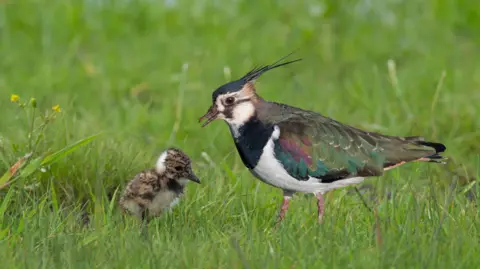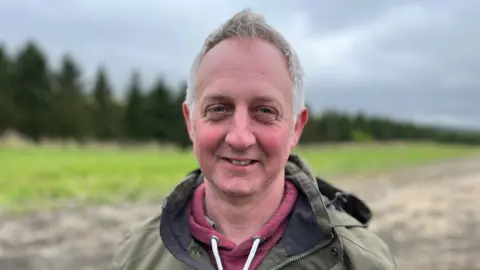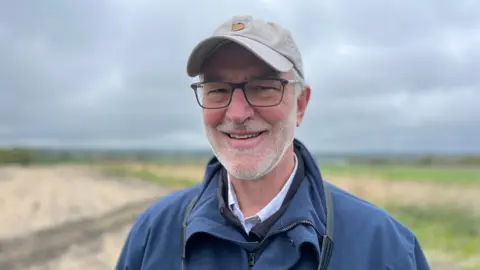Farmers helping iconic bird fear future funding cuts
 Getty Images
Getty ImagesFarmers in Hampshire and West Sussex have successfully restored populations of lapwings that are facing extinction.
They are encouraging the bird species, which is synonymous with farmland, to nest by keeping patches of fields uncultivated and protected from predators.
But some are concerned about the future of such projects, after the government suddenly closed the Sustainable Farming Incentive (SFI) green funding scheme.
The Department for Environment, Food and Rural Affairs (Defra) said it would give details of a new and improved scheme following a spending review.
Simon Butler, an arable farmer near Selborne in East Hampshire, said his grandad and great-grandad came to the farm in 1930.
"There were lapwings then and they'd have been there long before that," he said.
But lapwing numbers have fallen dramatically since the 1980s and they are now listed on the International Union for Conservation of Nature's (IUCN) Red List of Threatened Species.
Habitat loss and degradation due to changes in agricultural practice have reduced the availability of high-quality foraging habitat.
"They're a beautiful bird. It would be a travesty if we lost them."

Mr Butler is one of a number of farmers trying to encourage the birds back. He has fenced off three one-hectare plots in his fields, with cereals planted around them.
"There is a bit of extra work and hassle and cost," he said. "But it's well worth it if you can get the results.
"I'm proud of what we've achieved. We want the best crop of wheat, best crop of barley, but as farmers we want the most lapwings too."
He receives about £2,000 a year from government grants to offset the loss of crops and to maintain the habitat.
But he said he worried about the future of schemes like this following the government's decision to stop accepting new SFI applications last month.
"To take away environmental payments would be very risky and foolhardy," he said.
"Lots of farmers I know are seriously considering cutting back on environmental schemes because of funding cuts."
"We want to be planning long term. We don't want to be worrying whether we can continue this next year.
"The lapwings won't forgive us if we stop doing what we need to do and then they may not come back. If the lapwings go, what else has gone with them?"

Other farmers in the Selborne Landscape Partnership and South Downs Farmers Group are receiving advice, support and training from the South East Farming and Wildlife Advisory Group.
Adviser Matthew Norris-Hill is more optimistic that the government will continue to support farmers to manage their farms in a way which benefits nature, but he said farmers were concerned.
He said: "It creates uncertainty for people who were preparing applications and thinking of going into schemes this year.
"Farmers are uncertain about committing as they don't know what will happen if the funding plug gets pulled.
"We've seen a lot of grant funding stop, then start again, or not start again for a year. My message to government is to keep things consistent."
A Defra spokesperson said "We inherited farming schemes which were underspent, with farms missing out on millions of pounds.
"This government is investing £5bn into farming - the largest budget for sustainable food production in our country's history.
"We now have record number of farmers into schemes and more money being paid to farms than ever before.
"The government will reopen a new and improved SFI scheme with more details coming this summer."
You can follow BBC Hampshire & Isle of Wight on Facebook, X (Twitter), or Instagram.
